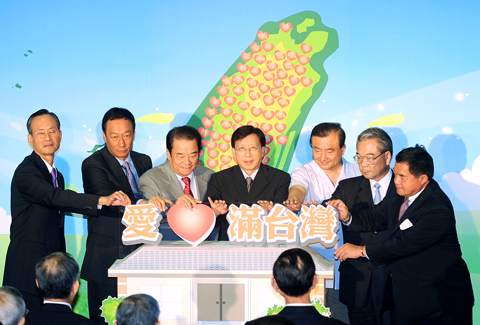More than 100 business representatives yesterday participated in a ceremony in Taipei to announce their intention to participate in the government’s reconstruction projects to tackle the devastation caused in large areas of southern Taiwan last month by Typhoon Morakot.
“When I was in the south, I heard a victim say that the north is Taiwan’s treasury, the south is its food factory, and the east is its holiday destination, which made me think that when there are places suffering hardship, we have to help them,” said Rock Hsu (許勝雄), chairman of Kinpo Group (金仁寶).
FEEDBACK

PHOTO: LO PEI-DER, TAIPEI TIMES
The contribution of businesses to the reconstruction effort is not only in response to the government’s expectations, but also to give something back to society, Hsu said.
“Disaster victims need more than a job. They need to develop industries that can link up with local culture. It’s never easy. Having good intentions is not enough, the government must have the implementation capacity to coordinate resources poured in by business,” Hsu said.
GUIDELINES
Hon Hai Group chairman Terry Gou (郭台銘) said that any reconstruction projects should be carried out according to land restoration and water management guidelines.
“If we can’t do well in the reconstruction to survive flooding caused by the next El Nino, it is possible that businesses’ responsibility will be looked into in the future,” Gou said.
Gou said that he also worried that the rules and regulations on the government’s procurement and construction projects would cause inefficiency and hinder private sector participation.
MISGIVINGS
In response, Premier Liu Chao-shiuan (劉兆玄) tried to clear up misgivings.
Liu said that all reconstruction projects would be implemented consistent with the principles of land recovery and that the Executive Yuan’s Post-Typhoon Morakot Reconstruction Committee would serve as a window for coordination between the government and business.
Minister of Economic Affairs Yiin Chii-ming (尹啟銘) laid out the government’s vision of rebuilding ravaged villages, saying that they would be model communities where the natural environment is preserved, people live a high-tech life and agriculture or industry thrives.
HOME NOT HOUSE
Liu said the government’s goal is to help victims establish a “home” and not just a “house.”
Chao Teng-hsiung (趙藤雄), chairman of the Taipei-based Far Glory Group (遠雄集團), said that he would like to talk to victims face to face to understand what they think of the reconstruction plan.

The first global hotel Keys Selection by the Michelin Guide includes four hotels in Taiwan, Michelin announced yesterday. All four received the “Michelin One Key,” indicating guests are to experience a “very special stay” at any of the locations as the establishments are “a true gem with personality. Service always goes the extra mile, and the hotel provides much more than others in its price range.” Of the four hotels, three are located in Taipei and one in Taichung. In Taipei, the One Key accolades were awarded to the Capella Taipei, Kimpton Da An Taipei and Mandarin Oriental Taipei. Capella Taipei was described by

EVA Airways today confirmed the death of a flight attendant on Saturday upon their return to Taiwan and said an internal investigation has been launched, as criticism mounted over a social media post accusing the airline of failing to offer sufficient employee protections. According to the post, the flight attendant complained of feeling sick on board a flight, but was unable to take sick leave or access medical care. The crew member allegedly did not receive assistance from the chief purser, who failed to heed their requests for medical attention or call an ambulance once the flight landed, the post said. As sick

Minister of Economic Affairs Kung Ming-hsin (龔明鑫) yesterday said that private-sector refiners are willing to stop buying Russian naphtha should the EU ask them to, after a group of non-governmental organizations, including the Centre for Research on Energy and Clean Air (CREA), criticized the nation’s continued business with the country. While Taiwan joined the US and its Western allies in putting broad sanctions on Russia after it invaded Ukraine in 2022, it did not explicitly ban imports of naphtha, a major hard-currency earner for Russia. While state-owned firms stopped importing Russian oil in 2023, there is no restriction on private companies to

INDUSTRY: Beijing’s latest export measures go beyond targeting the US and would likely affect any country that uses Chinese rare earths or related tech, an academic said Taiwanese industries could face significant disruption from China’s newly tightened export controls on rare earth elements, as much of Taiwan’s supply indirectly depends on Chinese materials processed in Japan, a local expert said yesterday. Kristy Hsu (徐遵慈), director of the Taiwan ASEAN Studies Center at the Chung-Hua Institution for Economic Research, said that China’s latest export measures go far beyond targeting the US and would likely affect any country that uses Chinese rare earths or related technologies. With Japan and Southeast Asian countries among those expected to be hit, Taiwan could feel the impact through its reliance on Japanese-made semi-finished products and